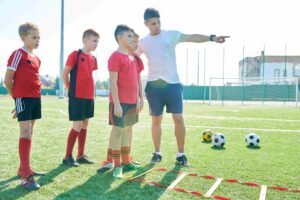The Essential Role of Special Olympics Football Coaches
Coaching in Special Olympics football is a complex and multifaceted role, but it is also one of the most rewarding experiences in sports. As a coach, you have the unique opportunity to guide athletes with intellectual disabilities toward success, both on and off the field.
The role of a Special Olympics coach extends beyond training — it includes teaching, mentoring, and motivating athletes while working closely with family members, officials, and other stakeholders. This guide offers key insights into the responsibilities and best practices for Special Olympics football coaches.
Understanding the Coach’s Role
Special Olympics football coaches wear many hats. They are teachers, advisors, mentors, and motivators all at once. Their job is to help athletes develop their skills, boost their confidence, and foster meaningful interactions with their peers, opponents, and supporters. Coaches play a critical part in athlete development and must also communicate with families, officials, and others to create an inclusive and supportive environment.
Best Practices for Special Olympics Coaches
Special Olympics promotes the Coaches Continuum Framework (CCF), which helps guide coaches through the coaching process. By following these best practices, coaches can ensure that their athletes remain at the center of their training approach.
Preparation is Key:
Every session should be planned in advance to reduce on-the-spot pressure and ensure effective training for athletes.
Key steps to prepare:
- Set a strategy for the upcoming training session or season
- Establish the topic or focus of the session
- Define key deliverables and points of focus
- Plan for progressions or adaptations based on individual athlete needs
Facilitating Athlete Development:
Sessions should always be athlete-centered, keeping each athlete’s unique needs and abilities in mind. This approach fosters progression while allowing athletes to develop at their own pace.
Coaches’ Commitment to Continuous Improvement
Coaches have a responsibility to stay updated on best practices and innovations in their sport. Continuous learning helps coaches offer better training experiences, meet the evolving needs of their athletes, and stay engaged with the latest developments in football.
Coaches must also be adaptable. While McKensie described coaching as “a constant rollercoaster,” Horton saw it as a “fun fair,” with exciting, scary, and ordinary moments. Both perspectives reflect the dynamic nature of coaching, emphasizing the need for flexibility and enthusiasm in the role.


